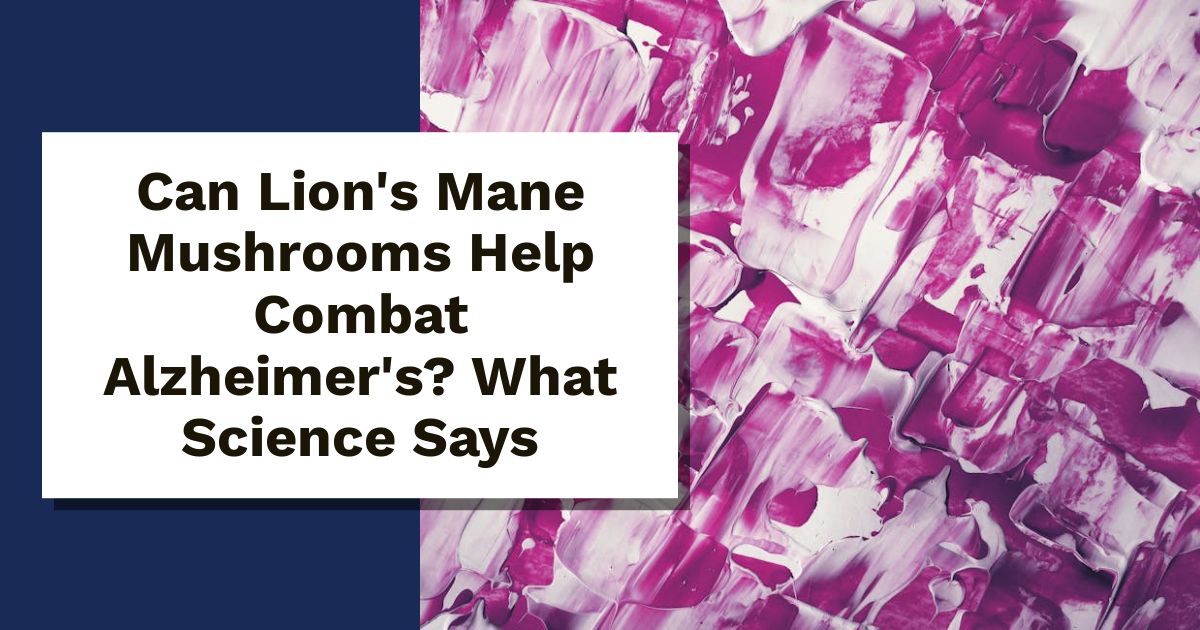Could a mushroom really hold promise against Alzheimer’s? Lion’s Mane, a unique and shaggy fungus, is sparking curiosity in both the medical world and among nature enthusiasts. Known for its potential brain-boosting properties, Lion’s Mane is gaining attention as researchers explore its possible role in fighting Alzheimer’s disease. With interest in natural remedies on the rise, this mushroom could offer fresh hope in tackling one of the most challenging brain disorders. Let’s look closer at what science says about this fascinating connection.
What is Lion’s Mane?
Lion’s Mane is more than just a funny name. This remarkable mushroom is turning heads with its health benefits. Let’s dive into what makes it special.
Appearance and Habitat
Lion’s Mane, scientifically known as Hericium erinaceus, is easy to spot in the forest. Why? Because it doesn’t look like your typical mushroom. Instead of caps and stems, it forms shaggy, white clusters that resemble—yes, you guessed it—a lion’s mane.
These striking fungi thrive in temperate forests, usually popping up on hardwood trees like oak, maple, and beech. They prefer dead or dying wood, making them nature’s cleanup crew. North America, Europe, and Asia are their primary stomping grounds. Want to learn more? Check out this guide on its habitat for all the fascinating details.
Traditional Uses
Lion’s Mane isn’t a new discovery. For centuries, it’s been a staple in Asian medicine, particularly in China and Japan. Why? Because it’s said to support brain health, digestion, and overall immunity. Some even claim it was used by monks to help sharpen focus and deepen meditation.
Beyond its mystical reputation, modern science is increasingly confirming its benefits. From potential nerve repair to reducing inflammation, this mushroom might be living up to its ancient hype. Interested in its traditional health uses? This Healthline article offers a great overview.
Stay tuned as we explore Lion’s Mane’s extraordinary potential!
Understanding Alzheimer’s Disease
Alzheimer’s disease is one of the most common and heartbreaking forms of dementia. It has a profound impact not just on the person diagnosed but on their families too. Characterized by progressive memory loss and cognitive decline, Alzheimer’s touches millions of lives globally. Here’s a closer look at what it involves.
Symptoms and Effects
Alzheimer’s symptoms creep up gradually but often worsen over time. At first, people might dismiss them as forgetfulness or just getting older. However, these symptoms can escalate into severe impairments that disrupt daily life.
Here are some of the most common signs:
- Memory Loss: Struggling to recall recently learned information is a hallmark of the condition. As it progresses, even long-term memories may fade. Learn more about the symptoms here.
- Confusion with Time or Place: People may get lost, unsure of where they are or how they got there.
- Difficulty Performing Familiar Tasks: Activities like preparing a meal or managing finances become challenging.
- Changes in Mood and Personality: Depression, anxiety, and irritability are commonly reported, sometimes coupled with significant behavioral changes.
- Trouble Organizing Thoughts: Planning or following steps to complete an activity may feel like solving an impossible puzzle.
To gain deeper insights into early warning signs, check out this resource.
Current Treatments
Managing Alzheimer’s is a challenge, as there’s no known cure yet. Current treatments aim to ease symptoms and slow the disease’s progression, but they don’t stop it completely.
Some of the most widely used treatments include:
- Medications: Drugs like donepezil, galantamine, and rivastigmine help improve memory and thinking in early to mid-stages. You can learn more about them here.
- Therapies: Cognitive stimulation therapy (CST) and occupational therapy can support brain function and help maintain independence longer.
- Limitations: Success varies greatly among individuals. Many treatments lose effectiveness as the disease progresses, leaving a critical gap in care.
For those curious about potential breakthroughs, check out what’s on the horizon here. While existing options help somewhat, they shine a harsh light on the need for innovative solutions. As research advances, there’s growing hope for more effective therapies in the future.
Lion’s Mane and Brain Health
Lion’s Mane mushroom is making headlines for its potential brain benefits, particularly when it comes to Alzheimer’s disease. Let’s break down how it might help preserve and improve brain function step by step.
Nerve Growth Factor (NGF)
The health of your neurons, those crucial brain and nervous system cells, depends heavily on a protein called Nerve Growth Factor (NGF). Think of NGF as a personal fitness coach for your neurons—it keeps them strong, functional, and ready to perform.
Lion’s Mane contains bioactive compounds called hericenones and erinacines that stimulate NGF production. This is significant because NGF helps with neurogenesis, the process of growing and maintaining nerves. More NGF means healthier neurons, which can slow down or possibly even reverse damage caused by neurodegenerative conditions.
Research backs up these claims. For instance, studies have shown extracts from Lion’s Mane mushrooms significantly increase NGF levels. According to findings summarized in a 2013 study, combining NGF with these extracts increased neurite outgrowth (nerve communication) by over 60%. This evidence places Lion’s Mane as a strong contender in therapies targeting neurodegenerative diseases like Alzheimer’s. Curious about how NGF impacts your nervous system? Check out this overview from the Alzheimer’s Drug Discovery Foundation.
Research Findings
What does science have to say? Research on Lion’s Mane and its effect on cognition continues to grow. One standout study observed adults with mild cognitive impairment over 16 weeks. Participants consumed 3 grams of Lion’s Mane daily and reported notable improvements in cognitive function, a promising sign for early interventions. Read the full study here.
But that’s not all. Another analysis noted that Lion’s Mane may also enhance memory and reduce stress levels. This ties back to its potential as an Alzheimer’s aid, as chronic stress is known to accelerate cognitive decline. If you’re eager to learn more, this 2023 review offers a deep dive into the mushroom’s broader cognitive effects.
Together, these findings suggest Lion’s Mane isn’t just hype. While more large-scale studies are needed to confirm its full potential, early evidence paints a compelling picture. Could it be the key to halting memory loss or even repairing neuron damage? Stay tuned; discoveries are happening fast!
How to Use Lion’s Mane
Lion’s Mane mushrooms aren’t just limited to labs and supplements; they’re versatile in the kitchen and easy to add to your daily routine. Whether you prefer chewing on mushroom steaks or popping capsules, there’s an option for everyone. Let’s break it down!
Culinary Uses
If you’ve ever tried Lion’s Mane in the kitchen, you already know how it can mimic meat’s texture. Chewy, hearty, and full of flavor, it’s a game-changer for vegetarians and mushroom lovers alike! Here are some tasty ideas to give your cooking a boost:
- Mushroom Steaks: Sear thick slices of Lion’s Mane in olive oil, butter, or ghee until golden. Pair it with a balsamic reduction for a juicy, steak-like meal. Need a step-by-step guide? Try this recipe.
- Sautéed Sides: A simple sauté with garlic, butter, and herbs creates a savory side dish that complements almost any meal. Try this 10-minute recipe to jazz it up.
- Stir-Fries: Add Lion’s Mane to a veggie-packed stir-fry alongside soy sauce, sesame oil, and fresh ginger. The mushroom absorbs flavors beautifully.
- Soups and Stews: Toss shredded pieces into soups for a chewy, “chicken-like” texture. It works wonders in broths!
- Breakfast Addition: Sub out your sausage patties for lightly fried Lion’s Mane bites on toast. It’s smoky, crispy, and satisfying.
Want to explore more? Browse this collection of recipes for more inspiration.
Supplement Options: Forms and Dosages
Not everyone wants to cook a meal every day. Thankfully, Lion’s Mane comes in supplement versions that are just as effective and convenient. Here’s what to know:
Forms Available:
- Capsules: Easy to take and available at most health-food stores.
- Powders: Perfect for smoothies or tea blends. Just scoop and stir!
- Tinctures: Concentrated drops that can be added to water or straight to the tongue for quick absorption.
- Gummies: Yes, even Lion’s Mane gummies exist for an easy-to-digest option.
Dosages:
The dose depends on your health goals. Clinical studies suggest taking 1,000 – 3,000 mg daily for cognitive benefits. Powder or capsule forms commonly start at 500 mg per serving, but always check the label and start with the lowest dose to gauge tolerance. Curious about dosages? This guide breaks it down perfectly.
Pro Tip: Always take Lion’s Mane with food, as it helps with absorption and minimizes any stomach irritation. Curious to explore more about supplement benefits? Read up here.
Ready to try it out? Whether you’re cooking up something delicious or embracing its nootropic benefits in supplement form, adding Lion’s Mane to your routine has never been so simple!
Potential Side Effects and Precautions
While Lion’s Mane mushrooms boast impressive benefits, it’s essential to approach them with a blend of curiosity and caution. Supplements may be a natural option, but they aren’t without potential risks. Here’s what you need to know before adding them to your routine.
Allergic Reactions
As rare as it might sound, allergies to Lion’s Mane mushrooms can happen, and they can be serious. For some, consuming it could spur symptoms such as hives, swelling, or even anaphylaxis. In one reported case, a 43-year-old man experienced severe abdominal pain, swelling, and hives almost immediately after consuming Lion’s Mane mushrooms. You can explore this case here.
Who’s most at risk? If you have a history of mushroom allergies or asthma, proceed with caution. Allergic responses may worsen due to heightened sensitivity in those with pre-existing immune issues. For more details on its potential risks, check out this Verywell Mind resource.
What should you do if you’re unsure about potential allergies? Start small. Try a low dose and monitor for any side effects. And of course, consult with a healthcare provider before making it part of your routine.
Consultation with Healthcare Providers
Thinking about taking Lion’s Mane regularly? Don’t make the leap before talking it over with a medical professional. While it may sound harmless, supplements can interact with medications or exacerbate certain health conditions.
Why is consulting a doctor so important? Healthcare providers have a complete understanding of your medical history, offering tailored advice that generic guidelines can’t provide. Supplements like Lion’s Mane can sometimes interfere with blood sugar regulation, which might impact individuals managing diabetes or on specific medications. This is why the FDA recommends discussing supplement use with your doctor. Learn more about consulting professionals in this FDA guide.
Not sure how to bring it up? Keep it simple. Share your interest in Lion’s Mane and ask if it’s a good fit for your situation. Wondering why it’s crucial? This article by Silver Sneakers sheds light on the significance of open communication with your doctor.
By discussing concerns beforehand and starting cautiously, you ensure both safety and a better chance of enjoying its potential cognitive perks. Always lean on expert guidance to avoid unnecessary risks.
Conclusion
Lion’s Mane mushrooms offer a glimpse of hope in addressing Alzheimer’s and its cognitive challenges. As research continues to unfold, scientists are exploring how this unique fungus might transform our understanding and treatment of brain health. From promoting nerve growth to potentially slowing cognitive decline, the evidence so far is promising, though additional studies are essential for conclusive results.
Why This Matters
When you look at Alzheimer’s, it’s not just memory loss—it’s an intricate web of emotional, physical, and familial challenges. Existing treatments can only do so much. This is why the potential of Lion’s Mane mushrooms, with their natural neuroprotective properties, becomes so significant. They might not be the ultimate answer, but they could be a piece of the larger puzzle. If you’re curious about how Lion’s Mane fits into this promising research area, check out this detailed source.
Building on the Evidence
While research remains in its early stages, findings suggest that Lion’s Mane impacts brain health in multiple ways:
- Nerve Repair: It encourages neuron growth that could repair damage caused by neurodegenerative diseases. Studies, such as this one in Medical News Today, hint at groundbreaking results.
- Memory Protection: Mice trials have shown enhanced recognition and memory improvements, paving the way for human applications.
- Beta-Amyloid & Tau Tangles Reduction: This vital mechanism directly addresses Alzheimer’s root causes; learn more here.
However, remember that until large-scale human trials conclude, Lion’s Mane remains a complementary—not primary—treatment option.
If you’re interested in diving deeper into how these mushrooms contribute to overall cognitive health, explore these insights. Whether you’re newly curious or already familiar, there’s more to uncover about their potential to transform brain care.
Dr. Cordy is a passionate advocate for the incredible benefits of Lion's Mane mushrooms, blending scientific insight with a deep enthusiasm for natural wellness. When he’s not exploring the latest research on functional fungi, you’ll find him chasing waves as an avid surfer, strategizing over chess matches, or embarking on outdoor adventures that fuel his curiosity and love for nature. A devoted dog dad and lifelong explorer, Dr. Cordy combines his diverse passions with a mission to educate and inspire others about the transformative potential of Lion’s Mane mushrooms. You can unearth his latest Lion's Mane insights here. 🍄


